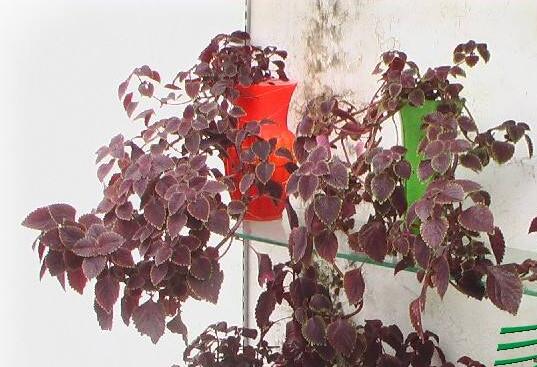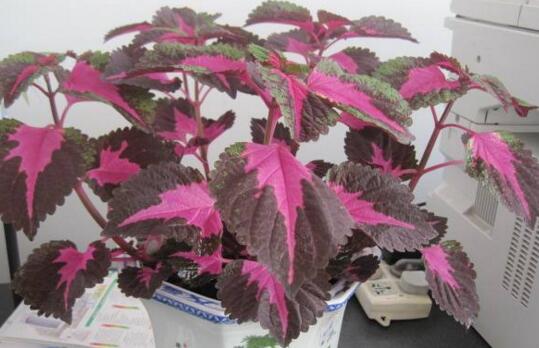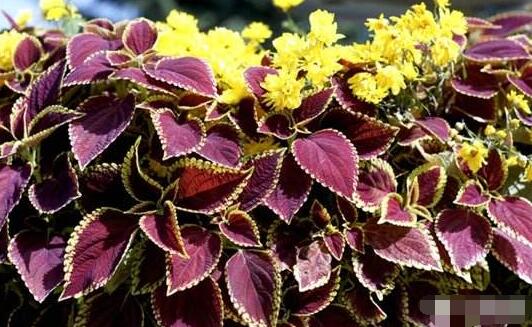Can colourful leaf grass be hydroponically cultured? the hydroponic method / time and temperature of colourful leaf grass is very important.
It is well known that the function and function of colourful leaf grass is mainly ornamental, and it is undoubtedly hydroponic that can play the greatest role of ornamental function, because it can not only observe leaves but also see the growth of roots, so can coloured leaf grass be hydroponically cultivated? The answer is yes, let's take a look at the hydroponic culture method of colourful leaf grass.
Can colourful leaf grass be hydroponically cultivated?

The adaptability and reproductive ability of colourful leaf grass is very strong, botanists have found that it can be hydroponically cultured, if the method is appropriate, the survival rate is very high, and colourful leaf grass hydroponic culture has many advantages, such as simple maintenance, better ornamental and so on.
Hydroponic Culture method of Colored Leaf Grass
1. Select utensils
As the colored leaf grass will be more exuberant during the growing period, the utensils should be better with a wide mouth. in addition, you should choose transparent utensils, which can see the roots more clearly and give the colored leaf grass enough light at the same time. The utensils need to be disinfected before hydroponic culture.
2. Select plants
For colored leaf grass used for hydroponic culture, the plant should be relatively strong for 1-2 years, and do not choose weak branches, withered branches and plants with diseased branches for hydroponic culture. After selecting the plant, remove it from the pot soil and slowly clean up the soil from the root.
In the process of cleaning, attention should be paid to avoid damaging the roots, cutting off the weak roots and excess fibrous roots, and pruning the upper branches and leaves. Keep the opposite leaves of the basal 1-2 nodes as a spare for cuttings. if there are more cuttings, you can tie the cuttings together with a rope.
3. Colonization
Fix the cuttings at the mouth of the bottle and make sure that the lower part of the cuttings is 5-6 cm below the mouth of the bottle, then add water to the container to flood the cuttings 3-4 cm, and then put it in a cool, ventilated place.
4. Change water and add nutrient solution
In the hydroponic culture method of colourful leaf grass, changing water is very important. In the initial stage, the water is changed once every 3-4 days, and the water is mainly clean water. While changing water, we should pay attention to adding proper nutrient solution to promote the rooting of cuttings, which can take root in 3-4 weeks. After that, you can choose soil culture or continue hydroponic culture.
Matters needing attention in hydroponics of Colored Leaf Grass
1. Temperature
When hydroponic culture, the temperature is kept at 15-25 degrees as far as possible, it can make colored leaf grass take root faster, if the temperature is too low or too high, it is not only difficult to take root, but also reduce the survival rate of hydroponic culture, so hydroponic culture is often carried out indoors.
2. Time
Hydroponic culture is usually chosen in spring or summer, winter is not suitable for hydroponic culture, so the temperature is low, colourful leaf grass usually has a dormant period, growth is almost stagnant, it is not easy to take root after hydroponic culture, and it is difficult to maintain.
Can Colored Leaf Grass be cultured in Water? the method of hydroponic Culture of Colored Leaf Grass
Colourful leaf grass is a kind of plant that is very similar to perilla. I believe that there are many people like Xiaobian who feel that colourful leaf grass is perilla at first glance. However, there is still a big difference between colourful leaf grass and perilla. If you don't believe it, come and have a look at it with the editor.
Can colourful leaf grass be hydroponically cultivated?
Colourful leaf grass can of course be cultivated by hydroponics. And water cultivation of colored leaf grass is not very difficult, at present, many flower shops sell colored leaf grass hydroponic culture.
Hydroponic Culture method of Colored Leaf Grass
1. Prepare a hydroponic container
Hydroponic coloured leaf grass had better choose a wide-mouth bottle, or simply cut off the top of the beverage bottle and fill it with water at the bottom. Clean the container before use, the water quality must be clean, and it is best to store the tap water at home in bottles for a day before use. Try not to use tap water directly.
2. Cut the branches of colourful leaf grass
When the main branch of coloured leaf grass or the side branch that passes through the heart has 4 nodes or about 10 cm in length, select the thick stem, leaving only 1 to 2 opposite leaves at the base, cut it off, and pay attention to the smooth cut without squeezing and tearing wounds.
Then cut off the lowermost pair of leaves of the cuttings, and if more cuttings are selected, they can be tied together with a white thread. After it is tied up, insert it into the prepared bottle.
3. Hydroponic maintenance of Colored Leaf Grass
Generally, it is best to insert cuttings into water from 3 cm to 4 cm from the mouth of the bottle. After that, put it in the place of scattered light, pay attention to changing the clear water every 2-3 days, and pay attention to replenishing the water in the bottle every day to ensure that the water level will not drop because of evaporation. The temperature of colourful leaf grass is generally 18-25 ℃, and white roots can grow in 7-10 days.
The difference between colourful leaf grass and perilla
1. Shape
Colourful leaf grass is a kind of perennial herb, the shape of the plant is ugly, there is no ornamental value.
The branches of the plant are covered with hair, the stem is quadrangular, and the bottom of the plant is lignified.
Leaves: simple leaves grow in opposite shape, oval shape, apex is very long and gradually pointed, edge with blunt teeth, the surface of the leaf is green, yellow, pink, scarlet and other colors mixed into a color pattern.
Flowers of coloured-leaf grass: terminal raceme with small, light blue or purplish flowers.
Perilla is an annual erect herb.
The stem of perilla: the stem is green or purple, obtusely quadrangular in shape, with four grooves and covered with pilose.
Perilla leaves: the leaves are broadly ovate or round, the top is short or pointed, the base is round or broadly cuneate, and there are coarsely serrated on the edge of the leaf. The surface of the leaves is green or purple, and the leaves are covered with villi above and pilose underneath.
Perilla flowers: its flowers are verticillum 2 flowers, the flowers are covered with villi, the flowers are relatively large, mostly pink and white.
2. Growth habits
Colourful leaf grass is a kind of warm plant, its environmental adaptability is very strong, the temperature should be kept no less than 10 ℃ in winter, shade should be paid attention to in summer, but enough sunlight should be ensured, so that the leaf color can be bright. So this kind of plant is more common in the south of our country.
Perilla is a kind of plant with strong growth adaptability, it does not have strict requirements on the growing soil, as long as it is on the sandy soil with good drainage, it mainly grows in the front and back of the house, the edge of the gully and other places, in addition, it can also be planted and cultured under the young fruit trees.
Is coloured leaf grass poisonous?
It's not toxic. If you intend to put it in the bedroom, you can rest assured to do it. In addition, it is not only non-toxic, but can play a role conducive to air quality. We all know that putting a pot of green plants in the bedroom can absorb a lot of harmful gases and reduce the impact of radiation on the human body, which is very beneficial.
Although colourful leaf grass is not perilla, it has the same beauty as perilla, so there are not a few people planting colourful leaf grass at present, but please remind everyone not to use colourful leaf grass as food. Colorful leaf grass is a kind of plant that is useless except for beauty and beautification of the environment.
Can colourful leaf grass be hydroponically cultivated?
Colored leaf grass has a strong reproductive ability, and it is often propagated by hydroponic cuttage, and the survival rate is very high. Hydroponic colored leaf grass is not only good-looking, but also easier to use than potted forms in terms of breeding difficulty. Then let's take a specific look at how to cultivate colored leaf grass.
- Prev

How to trim the colored leaf grass, the pruning method of the colored leaf grass / the best time to pick the heart
In the breeding method of colored leaf grass, we have emphasized the importance of pruning, which can not only make the colored leaf grass more beautiful, but also promote the germination of branches, so every flower friend attaches importance to pruning, so how to prune it? Let's take a look at the pruning methods of colored leaf grass.
- Next

How to fertilize colourful leaf grass, apply appropriate fertilizer / additional fertilization method at the right time
Although the demand for fertilizer of colourful leaf grass is low, we should not stop applying fertilizer completely when we plant it, otherwise it will have fewer leaves, yellowing or wilting because of lack of nutrition, so how to fertilize colourful leaf grass? The editor will tell you the answer. How to fertilize Colored Leaf Grass and choose good Fertilizer
Related
- Fuxing push coffee new agricultural production and marketing class: lack of small-scale processing plants
- Jujube rice field leisure farm deep ploughing Yilan for five years to create a space for organic food and play
- Nongyu Farm-A trial of organic papaya for brave women with advanced technology
- Four points for attention in the prevention and control of diseases and insect pests of edible fungi
- How to add nutrient solution to Edible Fungi
- Is there any good way to control edible fungus mites?
- Open Inoculation Technology of Edible Fungi
- Is there any clever way to use fertilizer for edible fungus in winter?
- What agents are used to kill the pathogens of edible fungi in the mushroom shed?
- Rapid drying of Edible Fungi

